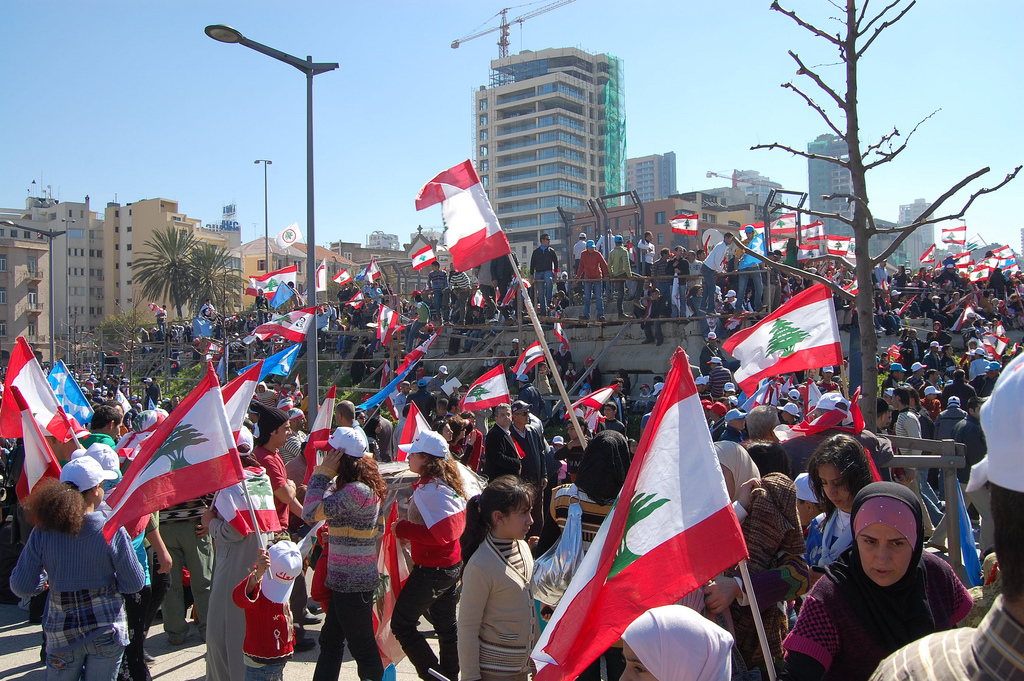by Aurelie Daher
Last Saturday morning, Al-Akhbar, a Lebanese daily opposed to the West- and Saudi-friendly March 14 movement, once again helped Wikileaks disseminate material, this time with 70,000 diplomatic cables from the Saudi foreign ministry. And nearly half a million more are lined up for publication through the holy month of Ramadan.
Riyadh acknowledged the authenticity of the cables as soon as they were published, although it suggested that “fake ones might have been added to the originals.” That’s not impossible, but rather unlikely for the simple reason that anyone who may bear ill will toward the kingdom quite obviously has enough to work with in the first batch.
Most of the documents refer to events between 2010 and 2012. To make a long story short, they abound with juicy details discrediting various political and media figures associated with the March 14 movement by reporting their eagerness to serve the kingdom’s interests—presumably at the expense of their own country and people—in return for compensation (gluttonous compensation in some cases). Moreover, it appears that the Saudis practice a degree of censorship over Lebanese media, at least to the degree to which they’re willing to take very concrete measures against some journalists and station directors of whose work they may not approve.
For example, we learn that former Lebanese president Amin Gemayel, leader of the Christian Kataeb party, intended in 2010 to join the initiative launched by then-Prime Minister Saad Hariri to reconcile with Damascus but assured Riyadh’s ambassador in Beirut that he would not take any step in that direction without “an authorization by the King [Abdullah] himself.” In the same vein, Samir Geagea, leader of the Christian Lebanese Forces, reportedly confessed the “extreme poverty” of his party—to the point that “he could not pay [his] partisans’ wages nor even his own bodyguards”—and to have thus asked for Saudi funding in exchange for which he said he was “ready to do anything that Saudi Arabia will ask of him.” Hariri himself, son of Rafik Hariri and heir to his assassinated father’s mainly Sunni party, the Future Current, seems to have had fewer money problems than problems of sensitivity and ego. Having been criticized on two occasions in Arab dailies belonging to Saudi publishers, he sent the articles in question all the way to the royal palace, urging that the powers that be “block these kinds of articles in the future.”
As for what happens in the media world, the Wikileaks revelations are chilling. The LBC television station, despite its sympathy for March 14, “should be pressured” for broadcasting reports that then-President Michel Sleiman asked the kingdom to “intervene” with Israel on the Shebaa Farms issue (thus suggesting that Saudi Arabia and Israel maintain cordial relations and that the former was capable of influencing the latter). The suggested pressure included not only failing to renew critical advertising contracts with the station (via Lebanese ad agencies that work for the Saudis) but also preventing the station from continuing to broadcast on Arab satellite channels. LBC’s sister station, MTV, felt compelled to sign what could be called a guardianship agreement with the kingdom. In return for two million dollars a year, the station would first and foremost be obliged to defend Riyadh’s interests.
In sum, the cables strongly suggest that the political and media leaders of the March 14 movement are expected to owe their primary allegiance to the Kingdom of Saudi Arabia and to accept effective censorship by its government.
Morally a Scandal, But Politically a Non-Event
In any country governed by the rule of law, the implicated officials would already have resigned. Some of them would presumably have been interrogated by police or other institutions charged with maintaining national independence and integrity. And Saudi ambassador Ali Saeed al-Asiri, who is depicted in the cables as anything but likeable, would have been expelled.
Unfortunately, in Lebanon, one thing is certain: this event will have absolutely no political impact.
First, one must recall that the “state” in Lebanon—in the sense of an authority situated over and above political parties and enforcing the law without regard to any ideological or partisan consideration—barely exists. If there were any authority superior to the MPs and ministers of government, it is a heterogeneous collection of sectarian leaders whose first priority whenever justice threatens one of its members, clients, or protégés, is to shield them from its clutches. Thus, no measure shall be taken against those leaders who have in some way violated or insulted national sovereignty.
The U.S. diplomatic cables from 2010 and 2011 exposed by Wikileaks contained far more startling revelations. For instance, right in the middle of the Israeli-Lebanon war in the summer of 2006, the great majority of the Christian March 14 leaders had asked Israel to prolong its already extremely destructive bombing of the country in the vain hope that Hezbollah could actually be defeated. The public also discovered from the U.S. cables that the then-minister of defense—also a March 14 official (and today the president of the board of the Interpol Foundation for a Safer World)—was providing intelligence to the Israelis to enhance their ability to strike targets on the ground. And, even without the Wikileaks’ disclosures, Lebanese were well aware that their then-interior minister, Ahmad Fatfat—also a member of Hariri’s party—had been caught red-handed collaborating with the enemy during the conflict. Well, none of these officials was ever bothered by the judicial authorities nor were they ever interrogated by the police. High treason is obviously okay when you’re a high-ranking politician.
More sadly, there wasn’t a reaction on the part of the electorate either. In Lebanon, political allegiances are first and foremost either a sectarian affair or a family tradition. It is (very) rarely about voting for a political program or ideology. Most people vote according to their confessional identity or because they’ve always voted that way, from father to son to grandson. It is even less likely that March 14’s constituency would seek to punish the officials implicated in the cables for two main reasons. As those officials themselves put it—quite appropriately by the way—“Those opposing us [meaning leaders of the March 8 movement and clients of Syria and Iran] do the same thing;” “After all, everyone knows how things are done in Lebanon;” being financed by foreign powers and actors “has always been a national tradition;” “we already knew that Hariri, Geagea, Gemayel, Chidiac and Cie were eating from the Saudi hand—nothing new here.” So what’s the problem?
Still One More Slap in March 14’s Face
This doesn’t mean that the latest Wikileaks revelation won’t have any effect on March 14’s cause. The main political impact will be the polemical advantage that has just fallen in the lap of the March 8 movement allied with Damascus and Tehran—meaning Hezbollah (Shiite), Amal (Shiite), and Michel Aoun’s party (Christian). And it’s not a trifling one.
The great fracture between March 8 and March 14 that took place in the spring of 2005 was built on a certain number of rival interpretations. March 14 opposed March 8 by presenting itself as the enforcer of the rule of law, as the representative of “democracy” (as opposed to Damascene fascism) and “sovereignty” (as opposed to remaining responsive to Syrian and Iranian “recommendations”). March 14 would thus refer to itself as “Libanists” and “sovereignists,” suggesting that its foes were neither real patriots nor independent in their decision-making. To Hezbollah, which justifies its refusal to disarm by citing Lebanon’s inability “to defend itself against future Israeli attacks,” March 14 replied that a rapprochement with the West, instead of Syria and Iran, was the best guarantee against Tel Aviv’s capacité de nuisance. And when the political unrest broke out in Syria in March 2011, March 14 claimed the victory, confidently predicting the imminent fall of Bashar al-Assad and, with it, a similar fate for Hezbollah. March 14 further assured the country that whatever regime took over in Damascus, it would surely favor March 14 and show respect for Lebanese sovereignty.
Time has not been kind to March 14’s rhetoric. The 2006 summer war demonstrated to those who were not yet persuaded that Western friendship is of little consequence when Israel decides to strike. The democratic principles supposedly embodied by March 14 can be summed up in the paralysis over the confessional electoral law designed to maintain a system that allocates parliamentary seats by sect with equal representation between Christians and Muslims (even though the population has become vastly more Muslim than Christian since the system was first devised in 1920. Indeed, in the two elections that have taken place since 2005, when Syria withdrew from the country, the majority of voters cast their ballots in favor of March 8. Yet the sectarian electoral system brought March 14 to power in each case. The courts have never dealt with the cases of gross corruption on both sides, not to mention high treason: so much for the March 14’s “rule of law.” The tragedy in Syria has amply demonstrated that my enemy’s enemy is not necessarily my friend. These are grosso modo the main arguments that its political foes use against March 14 today.
What has so far remained a problem for March 8 in its war of arguments with March 14 is the question of wilayat al-faqih. A Shiite concept par excellence, it establishes in its current version a hierarchical command link between Iran’s supreme religious authority and Tehran’s Shiite protégés, the most famous of which being Lebanese Hezbollah. For its part, Hezbollah has acknowledged the link, making it much easier for its March 14 foes to cast doubt on its own allegiance to Lebanon. Hezbollah has spent a good deal of time and effort over the years repeatedly trying to explain that wilayat al-faqih does not translate as absolute obedience as depicted by its adversaries. And March 8 also replied to those who accused the movement of fidelity to Damascus or Tehran that their charges merely echoed those of their own patrons, be they the U.S., France, and/or Saudi Arabia. To which March 14 would reply by referring to its relationship with these foreign powers as “mere alliance,” “advice,” or “recommendations,” insisting that there were “no institutional links” or “no direct instruction” as there presumably was with wilayat al-faqih.
Thus, the problem with the new Wikileaks cables is that they show that wilayat al-faqih is just as much a Saudi as an Iranian concept and that the “Libanists” and “sovereignists” were no more Libanist or sovereignist than their political foes. Indeed, the next time Hezbollah is accused of being tied to Tehran by wilayat al-faqih, the obvious reply will be: “Like you’re tied to Riyadh?”






How is this news? Lebanon has been a battlefield for any number of regional actors and been a geopolitical plaything for Iran, Saudi Arabia, Israel, Syria, Jordan, the U.S., the list goes on and on. It would be nice for once if everyone butted out and left Lebanon to the Lebanese and that goes for Israel and the Iranians and its support for Hezbollah.
Why don’t you name names. We the people need to know these people by name. Otherwise, the story is the same and it will continues.
bunch of political whore